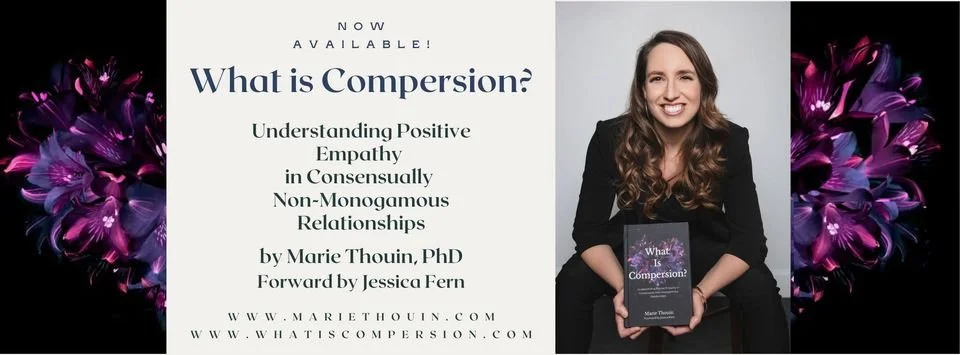
MY RESEARCH
Title: What is Compersion? Understanding Positive Empathy in Consensually NonMonogamous Relationships
Publisher: Rowman & Littlefield
Sign up for my mailing list to get updates about the publication!
Academic publications on compersion by Marie Thouin, PhD
Thouin-S., M.I., Flicker, S.M. (2023). Compersion. In: Shackelford, T.K. (eds) Encyclopedia of Sexual Psychology and Behavior. Springer, Cham. https://doi.org/10.1007/978-3-031-08956-5_2472-1
Flicker, S. M., Thouin-S, M. I., & Vaughan, M. D. (2022). Factors that facilitate and hinder the experience of compersion among individuals in consensually non-monogamous relationships. Archives of Sexual Behavior, 1-14. https://doi.org/10.1007/s10508-022-02333-4
Thouin-Savard, M. I. (2021). Compersion in Consensually Nonmonogamous Relationships: A Grounded Theory Investigation (Doctoral dissertation, California Institute of Integral Studies).
Compersion in Consensually Non-monogamous relationships: A Grounded Theory Investigation
I defended my dissertation on February 19th, 2021 (you can watch the recording on YouTube) and my dissertation is published and available here. Please enter your name and email address under “Stay Connected” below to receive updates about my future publications!
Abstract
This dissertation qualitatively investigates how individuals experience compersion in consensually nonmonogamous (CNM) relationships. Compersion is defined as “the feeling of taking joy in the joy that others you love share among themselves, especially taking joy in the knowledge that your beloveds are expressing their love for one another” (Ritchie & Barker, 2006, p. 585). This study invokes grounded theory research methods to gather data from 17 semi-structured, in-depth interviews with questions related to CNM relationships and individuals’ compersion experiences. Two overarching research questions guide the study. First, how do individuals in CNM relationships experience compersion? Second, what factors impact one’s compersion experience? Coded data yielded three major themes that illuminate how individuals in CNM relationships experience compersion: empathic joy, gratitude for benefits derived from a partner’s other relationship(s), and compersion as dynamic, fluid, and on a spectrum. Three types of factors (individual, relationship, and social) were then found to impact one’s compersion experience. Individual factors include an ideological commitment to CNM values & mindset, and security and comfort within oneself. Relational factors include themes of security & connectedness within relationship(s), positive integration of partner’s other relationship(s), and perception of outside relationship(s) as additive to individual and relationship satisfaction. Interviewees discussed coming into community as the primary social factor impacting compersion. This dissertation, based on rich qualitative data, presents a novel theoretical model that deepens scholarly understandings of compersion. Further, I suggest that compersion needs to be redefined for uses in both CNM relationships and other relational contexts, providing two useful definitions for future use. Overall, this study’s findings may support CNM individuals in increasing relationship satisfaction and foster a better understanding of compersion. I also argue that understanding compersion is an important step toward dismantling mononormativity by challenging the assumption that jealousy is the only valid response to extradyadic intimacy.
Background
Compersion in romantic/sexual relationships is arguably a very significant philosophical, cultural, spiritual, and evolutionary phenomenon. Knowing that infidelity and jealousy are one of the main causes of pain and separation in romantic partnerships, people are increasingly questioning whether humans are suited for lifelong monogamy. There are many voices, within and outside of academia, proposing that consensually non-monogamous relationship styles such as polyamory can help solve the conflict between the desire for long term partnership and the need for romantic and sexual freedom.
Yet, to rejoice in situations that, from a monogamous perspective, would lead to jealousy (such as a partner expressing romantic and/or sexual interest in someone else, or engaging intimately with someone else), would through the lens of popular culture be considered impossible, strange, or even pathological. This points to the widespread mononormativity that dominates our social institutions, from academia to healthcare to culture—all led by a language that reflects monogamy as the only legitimate, healthy, and acceptable way to conduct romantic and sexual relationships.
In the context of romantic and sexual relationships, compersion refers to the empathetic feeling of joy one experiences when their partner takes pleasure from another relationship. Thus, the experience of compersion powerfully dismantles mononormativity by demonstrating that it is possible to thrive within a non-monogamous context.
The importance of language in creating culture
People construct their identities from the language they are given to make sense of their emotions and experiences. Thus, the lack of adequate and popular words to express the concepts and experiences particular to consensual non-monogamy lifestyles perpetuates a cycle of ostracization and marginalisation for those who practice it. As such, the invisibility of the word compersion in our popular vocabulary makes it seem as though it would be impossible for someone to legitimately experience it.
Conversely, having the words to describe such emotions can support them being brought to life. Deborah Anapol, a pioneer of the polyamorous movement, made this argument: “Just having a concept which acknowledges that you have the potential of feeling joy and expansion rather than fear and contraction in response to a loved one’s sharing their love with others can go a long way toward transforming jealousy.”
However, it is a slow process for a word to become mainstream. I contacted the Merriam-Webster editors to advocate for the inclusion of the word compersion into their online dictionary, to which they responded that there was not yet “enough widespread general use to merit entry into our online dictionary” (Lee Goodrich, personal communication, February 3, 2017). To popularize the word describing this experience could be key to transforming narratives around the inevitability of sexual jealousy and possessiveness, in a similar way that the emergence of the label ‘gay’ in the early 1970s was important in terms of the expression of homosexuality as a legitimate sexual identity.
Thus, my research aims to further understand and normalize the concept and experience of compersion, so that it may be depathologized and seen by the academic and mental health communities as a healthy and normal emotional expression in romantic and sexual contexts.
